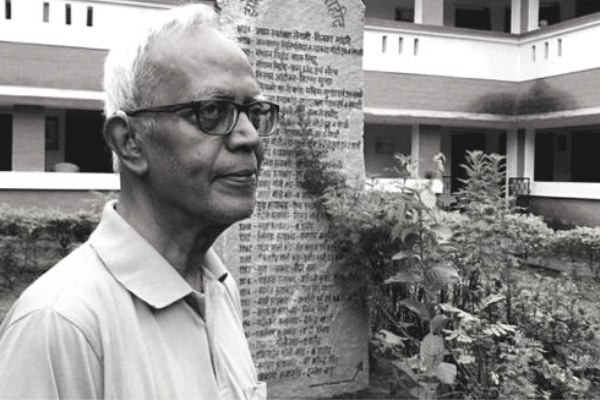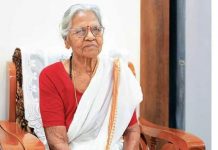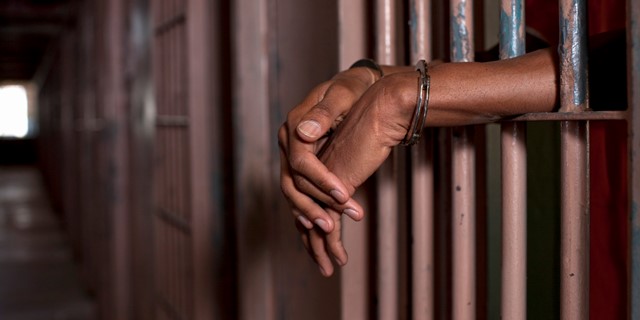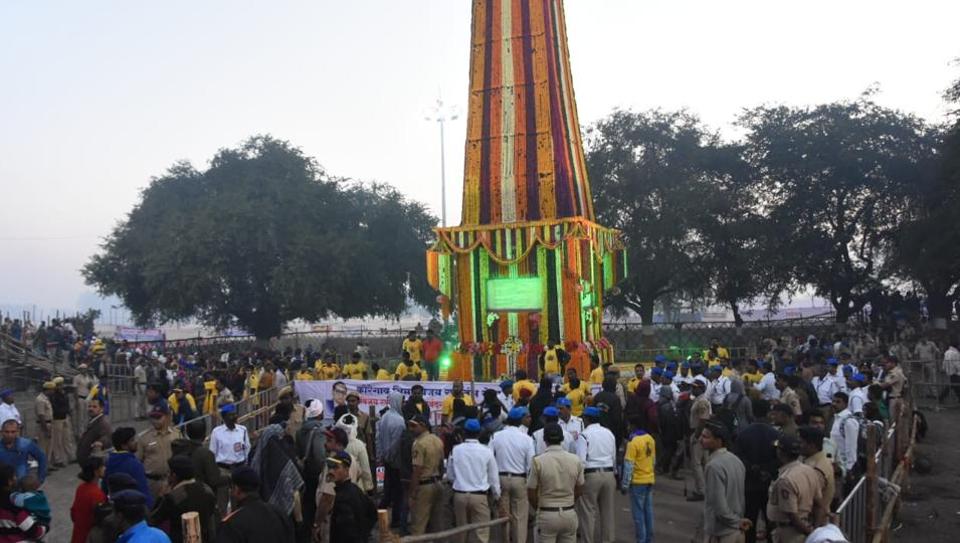On 8th October 2020, around 7.20 pm, four officials from the National Investigation Agency (NIA), the counter-terrorism task force of the country, entered Bagaicha campus, a Jesuit-run social centre, in Ranchi and arrested Fr. Stan Swamy. He was kept in the Ranchi NIA campus through the night. On the following day, he was taken to Mumbai. He was produced in court on 9th October. Fr. Stan respectfully stated in the court, “I neither had any connection with Bhima Koregaon incident nor any links with Maoists. All along I dedicated my life for the development of my poor Adivasi sisters and brothers. I wanted justice to be done to them as per the Constitutional provisions and Supreme Court judgements”.He was sent to judicial custody.
Fr. Stan is an 83-year old Jesuit, hails from a village called Virahalur, near Trichy, Tamil Nadu. He is a member of Jamshedpur Jesuit Province. He suffers from multiple illnesses, including Parkinson’s. After his Jesuit training, he had spent his active life mainly in three places – Indian Social Institute, Bengaluru, JOHAR, a Jesuit Social Centre in Chaibasa, and Bagaicha, Ranchi, in Jharkhand.
In 1963, the Indian Social Institute Bengaluru was established by the Jesuits. Fr. Henry Volken, Founder Director of the Institute, was a man inspired by the legendary book by Paulo Freire, Pedagogy of the Oppressed. The kind of critical methodology adopted to train the people was well accepted and acclaimed across various quarters and became a huge success, even among the Government and visitors from South East Asian countries. Following the bequest set forth by Fr. Volken, the baton was then handed over to Fr. Stan Swamy in 1975.
INSPIRATIONAL FIGURE
Fr. Stan, along with his colleagues, not only started to climb up the echelons in offering services to the needy but also began a series of training programmes using various analytical tools. The biggest strength of Fr. Stan lay in the spirit of the youth, irrespective of their social category, who yearned to gain knowledge about the state of the country.
He went ahead to teach socio-cultural analysis and had a critical yet innovative way of approaching it.Fr. Stan motivated many individuals, religious priests and nuns, university students, NGOs, and civil society leaders from various social categories to become aware of the hard realities in which Dalits and Adivasis lived and to question and respond to the unjust socio-economic and systemic oppression. Many social activists in South India fondly remember him as a beacon of hope for the marginalised.Stan served as the Director of ISI Bengaluru for 11 years and as training staff for six years. Once he returned to Jamshedpur, he used to visit his friends once in three or four years.
In 2019, he stayed in Bengaluru for a few months, due to medical reasons. Even during these months, despite his illnesses, he participated in various protests, to express his solidarity. He continued to share the struggles and aspirations of Adivasis and his work for and with them, to whoever came to see him.
EDUCATING AND HELPING ADIVASIS
In the late 80’s, he became the Director of Jharkhandi Organization for Human Rightscentre, popularly known as JOHAR (a word used in Jharkhand to wish one another),. He worked there for 12 years. He was disturbed by the hard realities of the ‘Ho’ tribe. Adivasis became his brothers and sisters. Soon, he learned ‘Ho’ language and spent his time educating and strengthening the hopes of the poor Adivasis.
In the 90’s, as India was opening its economy to a neo-liberal paradigm, a number of multi-national companies intruded into mineral-rich Adivasi lands. Many villagers were displaced from their habitats in the name of development. Fr. Stan had said, “Every mine that is dug, not only destroys the green forests, fertile lands and water bodies but also often displaces entire village habitations”.
By mid-’90s, discourse on the separation of Jharkhand from Bihar was picking up momentum. Considering the need for empowering the Adivasis, Stan moved to Ranchi in 2000. He stayed in a rented house and worked with the Adivasis.In 2006, Bagaicha was established as a common venture of the central zone Jesuit provinces of Ranchi, Jamshedpur, Dumka, Hazaribagh, and Madhya Pradesh, primarily for training, research, campaign and advocacy focusing on identity, dignity, justice and empowerment of the Adivasis.
PESA Act and Gram Sabha
Panchayats (Extension in Scheduled Areas) Act, popularly known as PESA Act, 1996 empowers Gram Sabha to take responsibility for the development of villages. It also makes provision for the establishment of the Tribal Advisory Council, headed by the Governor of the state, which will monitor the implementation of the PESA Act and Tribal Sub-plan and report back to the central government every year.
Realising that the provisions of the PESA Act were not implemented, Fr. Stan criticised various governments of Jharkhand and attempted to pressurise them to act. He articulated that Jal (water), Jungle (forest), and Jameen (land) belonged to Adivasis.
During these years, various multinational corporations were bent upon extracting the minerals from the very rich sources in Jharkhand, Chhattisgarh and Madhya Pradesh and Orissa. This process was generally preceded by a Memorandum of Understanding (MoU) between the government and the industries. The Gram Sabhas were never taken into confidence, as mandated by PESA Act. Fr. Stan actively participated in the movement led by Adivasis, which opposed the Netrahat Field Firing project, which was to displace thousands of villagers and a number of Adivasi hamlets in Jharkhand.He also opposed the large-scale Koel Karo dam project, which was to displace many Adivasi families.
LEGAL INTERVENTION
During 2014-15, indiscriminate arrests, of mostly Adivasi and Dalit youth, were taking place. Stan convened a meeting of people of goodwill so that a group could reflect on the nature of the intervention and even tentative plan details. The response was good, especially from lawyers. Sudha Bharadwaj was also one of the participants. The group decided to form a common forum by the name, ‘Persecuted Prisoners Solidarity Committee’ (PPSC), so that they could collectively intervene in the court, on behalf of Under-Trial Prisoners (UTPs), seeking immediate bail and speedy trial.Soon thereafter, based on the findings of the study of UTPs in Jharkhand, a PIL was filed in Jharkhand High Court. Stan was the main petitioner.
Looking at the veracity of the evidence, the Court ordered the State government to furnish all the information about under trial prisoners in Jharkhand. It is now more than two years and the State is yet to submit its report. On the other hand, Jharkhand state decided to put Stan out of its way, by implicating him in a case, merely based on his comments on Facebook related to the Pathalgadi movement.
PATHALGADI MOVEMENT
Pathals are stones, erected on the village entrance, following the age-old Adivasi tradition. Some Adivasi villagers in Khunti district of Jharkhand, inscribed in the pathals the Constitutional provisions given to the Gram Sabhas as per the Fifth Schedule of the Constitution and PESA Act. Soon pathals became rallying points for the Adivasis to assert their rights and demand from the state what is due to them as per the Constitution.
Pathalgadi movement became popular, which was seen as a threat by the government and corporate houses. As the slab inscriptions speak of the events and constitutional provisions, it has lately come under the scanner of the Government and labeled all those who supported the Pathalgadi movement as anti-nationals. Along with 19 others, the then BJP-led Jharkhand government filed an FIR against Fr. Stan for supporting Pathalgadi movement in 2018.
In June 2019, Fr. Stan came down to Bengaluru for medical treatment.One year after the filing of an FIR, in 2019, the Khunti court declared Stan as ‘proclaimed absconder’ under Sec. 82 of Criminal Procedural Code and issued orders for attachment of property. In October 2019, the Khunti Police took away two tables, a steel shelf, three plastic chairs, a mattress, and a pillow from Stan’s room.Stan contested the allegations in the High Court of Jharkhand. During the hearing, the Advocate General referred Stan as a ‘dreaded criminal’.
The Jharkhand High Court, on 6th December 2019, declared that proper procedures were not followed as per Code of Criminal Procedure. When the non-BJP government in Jharkhand was formed by the end of December 2019, it announced that it was withdrawing all cases relating to Pathalgadi. The procedures for the same have not yet been completed. This was a clear message that the Pathalgadi movement was not an anti-national movement but a pro-Adivasi movement demanding their due rights from the state.
Bhima Koregaon case
To everyone’s surprise, in 2018, Stan was implicated by the Pune Police in the Bhima Koregaon case. Stan had never been to Bhima Koregaon in his entire life. Bhima-Koregaon is a place in Maharashtra near Pune where the Dalits (former untouchables of India) gathered in big numbers on 1 January 2018 to celebrate the 200th anniversary of a battle in which Dalits fought against the rulers. During this celebration, violence suddenly erupted. The instigation of this violence is attributed to the upper caste right-wing forces which wanted to scuttle the celebrations.The Dalits filed an FIR in the Pune Rural police, which had jurisdiction over Bhima-Koregaon; Another FIR was filed with the Pune city Police which was taken cognisance immediately leading to the raids and arrests of defenders of human rights.
Only through the media, he came to know about this incident. His name did not appear in the original FIR. In 2019, a quash petition was filed in court. The public prosecutor argued that Stan was only a suspect and not an accused and the police had no intention to arrest him.
The new non-BJP coalition government in Maharashtra had ordered the Maharashtra police to review and speed up the investigation and trial of the Bhima-Koregaon riot case. On 1 January 2020, a top leader of the National Congress Party, a coalition partner, commented that the Bhima-Koregaon case was baseless and should be withdrawn.
However, the central government intervened and forced the Maharashtra government to hand over the case to the National Investigation Agency (NIA). Once the NIA took over the case, there were widespread arrests of intellectuals and raids at the homes of top human rights activists, professors, and lawyers.
Fr. Stan was interrogated for 15 hours in a span of five days in July and August 2020, by NIA. Despite his age and illness, he fully cooperated with the interrogation.
On 30 September 2020, the Superintendent of Police of NIA, Mumbai, called Fr. Solomon, a Jesuit companion of Stan, and asked him to bring Stan to Mumbai on 5th October. Solomon explained that Stan suffered from various illnesses and it would not be possible for an 83-year-old to travel to Mumbai, especially when the country was engulfed by the Covid-19 pandemic. The SP asked him to hand over the medical records. However, on 8th October, four NIA officers came to Bagaicha and arrested him, without summons or warrant. He is then sent to Taloja Jail.
WHAT STAN STOOD FOR
Fr. Stan’s statements mirrored what was happening in society:In the current system, justice is beyond the means of most of those who have been falsely accused.
When the youth stand up against the systemic wrong (forced land dispossession), they are putting themselves at risk of being arrested and imprisoned for years without trial.
Compulsions from the corporate houses outweigh the government’s obligation to the citizens of the country.
They say, ‘Truth will finally prevail’…but how long is it going to take… and how much damage is being done in the process… Questions to ponder.
#STAND FOR STAN
Various prominent leaders from different fields extended support through social media and stood in solidarity with him.
Mary Lawlor, the United Nations Special Rapporteur on Human Rights Defenders tweeted from her official Twitter account: “Hearing worrying reports of #humanrightsdefender Stan Swamy being taken into custody by the @NIA_India in Ranchi, Jharkhand”.
Hemant Soren, Chief Minister of Jharkhand, raised a question asking what the intention of the government was in arresting 83-year-old Stan Swamy and whether their sole motive was to curb every dissenting voice.
Shashi Tharoor, MP, had tweeted, “Arresting an 83-year-old social worker who has brought help to the helpless for decades is a national disgrace. It’s also eroding our country’s standing as a liberal democracy in the eyes of the world”.
More than his ailing health, what was more prominent about him, like always, was the fact that he stayed strong and confident.
Fr. Stan leaves behind a legacy. If we realise the importance of our Constitution and continue to uphold its values, we would be paying homage to him and India’s founding fathers and stand in solidarity with all defenders of human rights.
Dr. Joseph Xavier SJ is the Director of the Indian Social Institute, Bengaluru and Harshita is studying for her Masters in Social Work at St. Claret College.
The article has been republished from The Leaflet.













